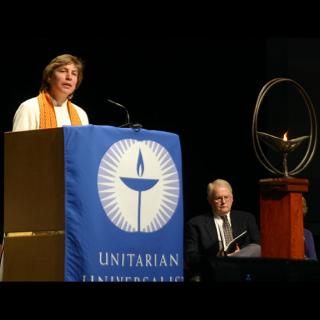Sermon Award Worship Service
General Assembly 2009 Event 4003
Sermon: “What Can’t You Eat?” (PDF, 5 pages) by Rev. Alison M. Cornish
Service Text (PDF, 4 pages)
At this annual event, jointly sponsored by the Commission on Social Witness and the Unitarian Universalist Ministers Association (UUMA) a winner is selected from the anonymous submission of sermons preached by ministers or lay persons. The sermons respond in some way to the study issues adopted for consideration within the Association. This recognition includes a $500 award and the opportunity for the recipient to preach at General Assembly.
Rev. Carol Kingston from UUMA presented this year’s award, noting that this year’s award recipient, Rev. Allison Cornish, is receiving the award for the second time. In 2002, she received the award for her sermon, delivered as a lay leader, on globalization and economic justice.
This year Cornish preached on sustainable and ethical eating in a sermon titled “What Can’t You Eat?” written to address General Assembly’s 2008 adoption of the study issue on ethical eating and environmental justice.
Reverend Cornish opened her sermon with a description of the complex negotiations in searching for common ground within an interfaith group she is part of. The group asked the question “Can we eat together? Attempting to create social connections with food in a multifaith, multicultural environment meant navigating a complex set of holy days, or fasting periods, and dietary restrictions. She recalls being asked the question, “What don’t Unitarian Universalists eat?” There are no “don’t eat” dietary rules assigned by our religion, but there are a number of food ideologies. Potential conflict and hurt feelings arise when the vegans declare they cannot eat at an event where meat is even present, provoking the omnivores into a righteous defense of their right to eat whatever they want.
In reflecting on that question, Cornish began to consider how her food choices might be informed by her religious tradition. She shared her own story of dietary choices and evolving theology around food and its consumption.
As a young adult she quit eating meat for financial reasons, also finding that her college vegetarian dining options were a lot more appealing than the omnivore ones. After reading Frances Moore Lappe’s seminal work on food production and equity, Diet for a Small Planet, she became aware of the justice issues around the environmental and land use costs of the grain to animal food cycle. Diet for a Small Planet counseled readers to eat lower on the food chain so they could maximize nutrition available to all. It was advice that Cornish embraced.
She continued to eat fish, however, explaining that (in the seventies before the days of intensive fish farming) fish were wild, from the oceans. As a child and teenager she fished with her brother, catching, killing and preparing the fish for consumption. That history gave her an authenticity in her consumption of fish, a food she understood and took responsibility for. Not having the experience of killing and butchering other food animals, chicken, lamb or cow, she chose not to consume those foods.
Cornish described the questions she asks about food, about “what can’t you eat?” Guided by the Unitarian Universalist principles of justice, equity and compassion, and of the respect for the interdependence of life, she asks questions which give her a spiritual basis for her food choices and encouraged others to do likewise.
In addition to asking questions about the welfare of the elemental and human forces which bring food to our plates, she offered these practices to deepen the theology of consuming and approach the “spirituality of eating.”
- Cultivate mindfulness: gratitude and thanks. Take a moment of prayer, silence or meditation, pondering questions such as “where does this food come from? How is it produced?”
- Ask some tough questions generated by our principles—justice equity and compassion as well as interdependent web. “Are the fruits and veggies grown sustainably?” “Are the farms, plants, packing operations and transit worker-friendly?” “Are the operations related to getting the food to our tables fuel efficient?” Finally, “Is the food on our tables cruelty free?”
She counsels overwhelming defiance: lots of people advocating for, working at and accomplishing a change in how we eat. to eat more “healthily, sensibly, and locally.”
Can any such movement make the difference? If every citizen in the United States ate one organic meal a week we would reduce oil consumption by 1.1 million barrels of oil every week. Other examples she gave included land reform in Brazil, inner city school gardens. turning land to food use.
A Newsday article describes a place close to her home: Riverhead Suffolk County Correctional Facility. She shared the story of Samantha, a 26 year old inmate who is completing a course in kitchen gardening, who speaks a powerful testimony. Weeds run really deep just like negativity out in the world. Good things need to be tended carefully just like the good things in life. “I learned that here, in this garden”
Cornish offered the thought that“the good things need to be tended daily. What better way than to have your food and your spirit in harmony?”
Reported by Rebecca Kelley-Morgan; edited by Jone Johnson Lewis.

